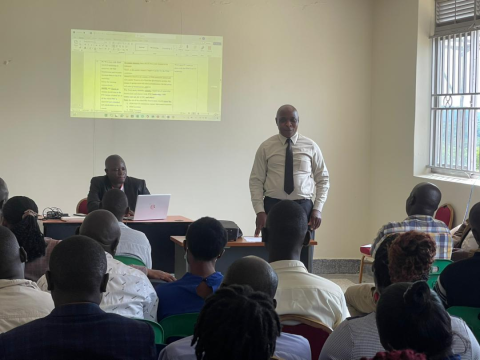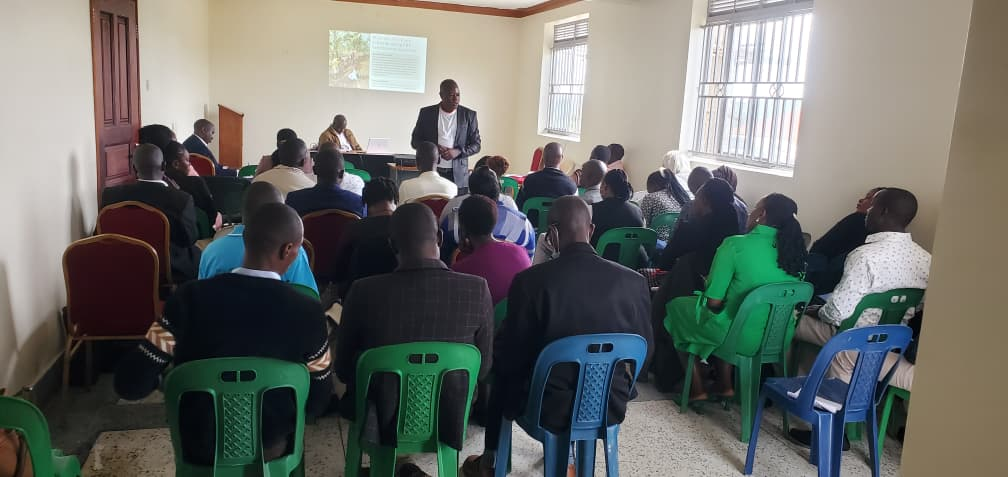Achieving Sustainability of Parish Revolving Funds through PDM Practical Learning Centres
On 5th November 2025, the Production Department convened a significant meeting at the district headquarters to engage parish chiefs, Community Development Officers (CDOs) extension workers, commercial officers and all other key stakeholders in the implementation of the revised guidelines for revolving-fund disbursement under the Parish Development Model (PDM). Central to the discussion was the introduction of Practical Learning Centres (PTCs) an initiative designed to ensure that farmers receive hands-on training in demonstration gardens before accessing the revolving funds.
Opening the session, Mr. Sebabi William, the PDM Focal Person, welcomed participants and urged them to be fully attentive and absorb the training provided. “I would like to welcome members to the meeting and encourage members to be attentive and learn all that has been presented,” he remarked. His words set the tone for a day oriented toward active learning and capacity-building.
Representing the Regional Support Liaison Office, Shimon Kiwanuka commended the attendance and emphasized the importance of embracing the new PTC structure to enhance service delivery. “I welcome members to this practical learning centre meeting. I would like to urge us all to embrace the new changes to enable the parish beneficiaries receive service delivery,” he urged. His statement underscored the transition from traditional fund disbursement to a more holistic, learner-centred approach.
District Production Officer Mr Kiddu Ben followed with a reminder of the collective responsibility of all actors in the PDM ecosystem. “I would like to encourage all members to each do their roles for the harmonious improvement of service delivery and enable farmers and beneficiaries benefit from the PDM,” he said. His comment highlighted that the success of the model relies not just on funds but on the coordinated effort of parish chiefs, extension workers, CDOs and oversight officers.
In his closing remarks, Mr Katende Ronald expressed gratitude to everyone involved: the participants, the facilitators, and the broader national leadership. “I would like to thank members for attending and also thank the facilitator for delivering the message well. I would also like to thank President Museveni for the initiative to sustain all households and empower economic transformation,” he noted. His remarks linked the local meeting to the national aspiration of transforming subsistence households into active economic actors, as articulated in the PDM guidelines.
Underlying the PTC-CBF (Practical Learning Centres – Community Based Facilitators) framework is the Experiential Learning Model, an approach firmly rooted in learning by doing. During the session trainers emphasised: “When farmers just hear, they forget it. When they see it, they remember it. When they do it, they own it for life.” This mantra signals the shift away from traditional top-down training toward farmer-driven learning.
The literature reinforces this: farmer-educators in Uganda increasingly adopt approaches such as project-based, place-based and problem-based learning to enhance uptake of new practices. The experiential model emphasises that learners must engage, reflect and then act — a cycle often absent from typical extension models which focus on one-time technology transfer.
In practical terms, participants at the meeting learnt how the theoretical model translates into field action. First, farmers determine what they will study in the PTC, rather than being handed pre-packaged topics. This ensures relevance to local needs. Facilitators then guide farmers through hands-on exercises, enabling them to test, observe and adapt technologies in small groups of ten to fifteen.
The cycle continues: farmers implement their decisions, reflect on the results and mentor their peers. This sequence builds ownership, making farmers the drivers of their learning journey rather than passive recipients. Furthermore, the PTCs aim to strengthen the social capital of farmer teams so they are better able to engage with extension and research services, hold service systems accountable and protect themselves from dubious offers.
By embedding the experiential learning model in the PDM’s operations, the revolving-fund mechanism gains a more robust foundation. Rather than simply disbursing cash, the model ensures that funds are matched by capacity, relevance and sustainability. This approach aligns with the PDM’s overall goal of moving households from subsistence to the money economy.
In conclusion, the 5th November meeting marked a turning point for Gomba District’s PDM implementation. The introduction of Practical Learning Centres anchored in experiential learning signals a shift toward deeper change: from outputs to outcomes, from passive recipients to active learners, from ad-hoc interventions to sustainable empowerment. The success of the parish revolving funds will depend less on the size of the cash injected and more on whether farmers are equipped, engaged and empowered to use it wisely.

Regional Support Liaison Office, Shimon Kiwanuka training the members about the new guidelines under the Sustainability of Parish Revolving Funds through PDM Practical Learning Centres meeting

The Chief administrative officer Mr Donath Eswilu giving remarks during the Sustainability of Parish Revolving Funds through PDM Practical Learning Centres meeting

The Resident District Commissioner Mr Donath Eswilu giving closing remarks during the Sustainability of Parish Revolving Funds through PDM Practical Learning Centres meeting

